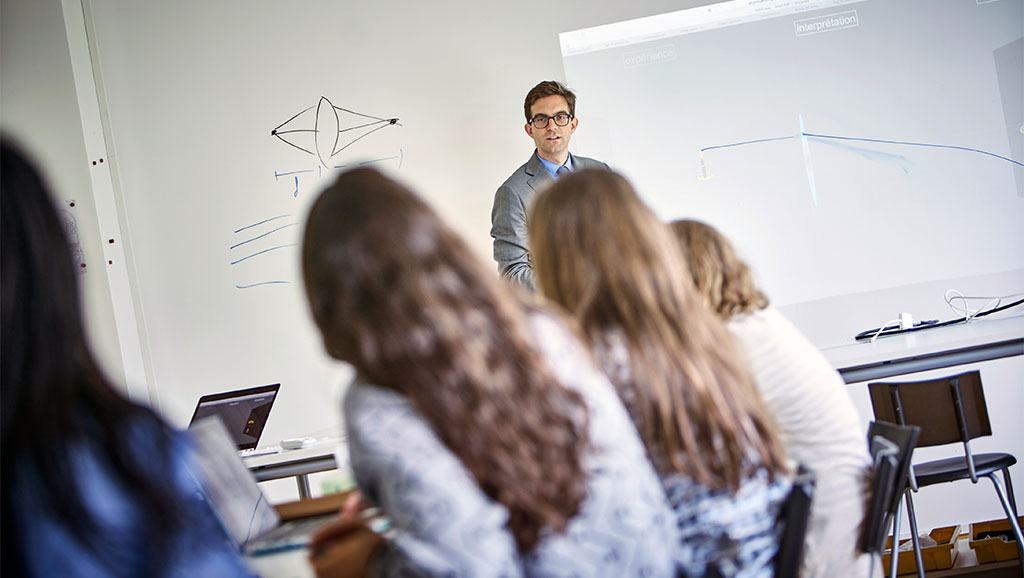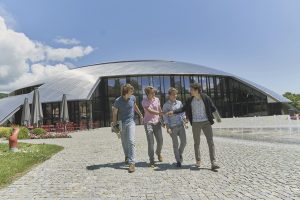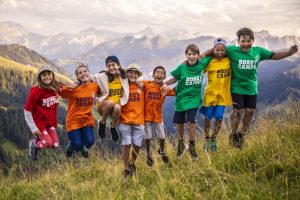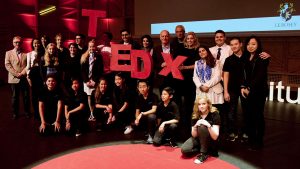
17 Jul Switzerland’s most prestigious boarding school Le Rosey sets the benchmark for best secondary education
Christophe Gudin, General Director, Institut Le Rosey, offers an insight into why international students and their families place so much trust in this elite school
Institut Le Rosey is reputed to be the most distinctive private boarding school in Switzerland, with roots that go as far back as in 1880. This is a very unique educational institution that provides a stamp of prestige and exclusivity. How would you sum up the essence of Le Rosey that makes it so unique?
Le Rosey is a particular school in a number of ways. First of all, because of that crazy idea from my predecessor who, during World War 1, decided to move the entire campus in the winter to what was then a completely unknown ski resort that was just connected by train, which is Gstaad. For the past over 100 years now, the entire school moves to Gstaad for the winter: every student, every teacher, our entire staff moves to Alps to spend two months up there. It’s interesting because it defines a lot of the school’s character. It allows for a different atmosphere, up in a beautiful town rather than in the clouds during the winter around here in the lake region. This dual campus set up is very much part of the DNA of the school: it enables us to break any routine and ensures that we don’t do anything in the same way for too long in the school. As we are a boarding school, this also means that our students change roommates twice a year. Each time you move campus, you change your routine, you change your daily schedule to change the sport you’re doing. And having to adapt is probably one of the key elements of Le Rosey.
Another distinctive feature of the school is its cultural diversity. We never take any more than 10 percent of our students from one country or linguistic region, which means that we have, among our 400 students, around 70 countries represented every year. A lot of international schools have expatriate children from a broad range of nationalities; the difference with Le Rosey—and to some extend a number of other Swiss boarding schools—is that the students we have live in those different countries but come to school here. So, we’ll have a Chilean kid, one from Los Angeles and one from Tokyo, who will live with their families there, come to school with us and then go back home. The vast majority of them won’t feel like third-culture kids—they don’t feel like they don’t have a culture, on the contrary they feel that they are adding to our local environment here.
They feel proud and rooted in their own culture, which I think brings a very interesting mix to the school. This is reinforced by our linguistic policy, since Le Rosey offers over 25 languages as a mother-tongue language, to make sure students can keep studying in their own languages and can keep in touch with their literature. We offer anything from Swahili to Persian, Japanese to Russian—anything. Any language you speak, we find a way to let you practice it at Le Rosey. That’s one of the beauties of being in Switzerland: you do find people that are extremely international and have the capacity to teach. This is the second very significant differentiator for Le Rosey.
The third one is probably the community that the school creates. Most boarding schools create a tight-knit community but this is even more true in the case of Le Rosey because of the relationship that the adults have with the children on campus. It’s a very natural relationship because teachers are living with the students, with their families, in the school. That creates a very peculiar link: you follow your students day by day, you know what has happened in their lives on any day, you notice when something happens in their teenage lives and you have a very profound relationship with the kids. These ties remain through life because the children stay linked and as they become adults. Our alumni association is one of the most tightly knit that you could have. It spreads around the globe and covers nearly every large city in the world.

Could you help us understand the importance and contribution of the school to the country and the world?
We have foreign students coming from 70 countries. We take students based on a range of different criteria but they do have to be academics and the proof of this is that over 30 percent of them go on to the world’s Ivy-League-plus universities. We have roughly 4,500 alumni around the world that are connected. We have staff ratio of one for every two students and a teacher ratio of one to four in the school. We have a 900-seat concert hall on campus that is open to the public, where we have some of the biggest classical orchestras perform—such as the Royal Philharmonic and Berlin Philharmonic—as well as singers and theater performances. The idea is to bring cultural inspiration to the Roseans but also to open those experiences up to the region that has hosted us for over 120 years. That’s working very well, as we have a very faithful public attending our shows. There’s great synergy there with the Roseans, who welcome them, show them their home and share those cultural events in their home.
Now, the biggest impact I think Le Rosey has is probably the way our students spread some love of Switzerland: most of the students that come here fall in love with the school but also with the country. Their families, who are in leadership positions around the world, also retain very strong ties with Switzerland. And Gstaad is probably the epitome of that because, although it’s where the students spend the least amount of time, it’s where they feel the closest because we’re in this small mountain village all winter and the deepest links between them are created there. Many of them come back: we have 1,000 alumni that come back to Gstaad roughly every year, which is quite significant. A large number of them have kept ties to Gstaad, bought chalets and come back regularly. This love of Switzerland, this retention of Switzerland in their lives has promoted the country all over the world to some extent—our school has quite an important and powerful ambassadorship role.
There is a strong spillover effect, in terms of gross domestic product, as every year new families discover Gstaad, fall in love with the place and return for future visits. The economic impact of Le Rosey on Gstaad is quite significant. And I have to say, it’s a love story between the two. Gstaad has also played a big role in the development of Le Rosey and on its history and image—it’s a very tight and strong relationship.
COVID-19 has dealt a major blow to economies across the globe, with governments forced to take drastic measures to contain the outbreak. Schools and universities were some of the first to shut down. Tell us a bit about your experience here at Le Rosey—how quickly did you have to rebuild your strategy to adapt the curriculum to a home-learning model?
The COVID-19 episode was interesting because it was the steepest learning curve the teachers have had in a long time. They had to relearn their job within a couple of weeks but it worked much better than we expected it to. We have changed the way we deliver classes: instead of having a lot of interactions we had some very short bursts of lectures, and then autonomous work that the students had to do with teachers available to answer their questions. At the same time, we had to limit screen time as much as possible—because screen time had become an increasing issue for many of the world’s educators before COVID-19 came along. Obviously, we can cover less content and it’s still less efficient than having the children in front of you, but our system has worked quite well.
One thing we’ve discovered is that our relationships, the pre-established relationships, were crucial. Because we have teachers who are very close to their students, this worked well. There is a high level of trust between our students and teachers that made them successfully connect virtually. In one instance, we had one absent teacher and another teacher came in to replace her. What happened is that the replacement teacher felt the class was so much more difficult to teach because they didn’t know the students. It was interesting to see the limit of the models there but, overall, transitioning to an online platform was quite easy for us because everything was set up. We were already ready for it, so the technological aspect was under control but the pedagogical aspect did play a role. We’re now moving to a hybrid model where we have half the kids back on campus and half at a distance, and I have to say this is much trickier. While we figured something out for the remainder of this term, we can’t imagine this going on much further without completely overhauling the model.
Schools and universities are in slightly different position here. By definition, we have smaller classes than most universities. The relationship you have with the teacher defines a lot of how much you’re going to learn and how you learn. You need to build this relationship before you’re able to move it. But it does open a number of interesting areas once you have this relationship built. We’re currently building a small camp in Kenya at the foothill of Kilimanjaro, where we plan to send classes of roughly 70 students at a time to engage in conservation work to replenish and reforest a large part of land that was deforested, to work with the Maasai people in the village and in a local school. This big project has been ongoing for some time and we did have a concern about how we were going to keep teaching kids while they were down there. With what we’ve learned in the past weeks, we’re far more confident about this model than we were previously. We know we’re going to be able to combine on-the-ground work in Kenya with remote learning through our teachers staying here in Switzerland.

Despite Le Rosey’s attachment to its traditions, discipline and educational standards, the school has always been innovative and at the forefront of many pedagogical advances, especially in the areas of language teaching, biculturalism, personal development, the integration of sports and arts in daily life, motivation and the role of values in education. What would you say are some of your most outstanding initiatives?
The biculturalism we have is quite unique because we don’t teach the same class in two languages. We teach roughly the same content in the two languages but with different approaches. The French-speaking teachers will teach it the way you learn in French, while an English speaker will teach you the way you learn in English. We’ve had our own curriculum that we’ve adapted and have just overhauled it to make sure t is aligned between the two languages even more closely than it was. You can switch from one year to another very easily by, for example, taking geography in French this year and in English next year. I think this is a very powerful way of being in constant adaptation, having to adapt to a new mode of thinking, to a new mode of teaching and this is something that we think is absolutely crucial. That is obviously, pedagogically, one of the big innovations of Le Rosey and to my knowledge, we’re one of the very few schools that do it at this level, with such a different approach that is tailored to the students because they can essentially pick any class they want in any language. Every Rosean has a tailor-made schedule that is going to be different from their classmates.
Can you tell us about your admission procedure—what are some of the key criteria that you are looking at?
We want to meet all the students that we admit. Typically, they come to the campus to see what Le Rosey is about but also for us to see how they fit—the cultural fit and the value fit are a very important aspect for us. We need students to feel they are going to be here. Our students all come from privileged backgrounds; however, people are surprised when they meet them: they sometimes expect to see snobs and soon realize how normal, courteous and happy they are to see visitors and how respectful they are. Any kid coming in here thinking they’re the king of the world, or special because they’re the child of so and so, is in for a big disappointment. That’s another reason why a number of strong families send their children here. Recently, we had the daughter of a very famous, popular person in the U.S. who told me she wanted to be anonymous here when she joined us and it worked—she’s treated like every other kid.
Obviously, the academic level is going to be an important aspect as well. We need, at the minimum, somebody that will be able to thrive in either the French baccalaureate or the international baccalaureate. We offer these two diplomas that require a level of academic engagement and, besides, we offer a range of other activities, sports, arts and additional things you need to do beyond academia. We select students that can cope with this level of activity. A last key criteria is how much our students are going to be involved in what Le Rosey has to offer—from the hundreds of weekly activities we provide covering sports, arts, technology, cultural events and cultural trips to meeting different people at conferences and debating with them. All those activities eventually sum up the Rosean benefit.
How is the school working to expand its international reach and network?
Le Rosey is profoundly Swiss. Roughly every six months we have very serious proposals on the table to open a campus in the United Arab Emirates, the Far East or in the U.S. We have considered it a number of times but have concluded that we’ll never be able to do it because Le Rosey is so profoundly Swiss. It wouldn’t be the same school, it wouldn’t be the same ethos and it wouldn’t have the ability to capture the whole world, like we do in Switzerland. There are very few countries where children from anywhere in the world can feel comfortable. That is a key aspect of what Le Rosey is. We’re opening this camp in Kenya now but it’s a very different setup, where we’re going to send students from Switzerland there temporarily—we’re not opening a full school there.
Obviously, we also have a very big network of universities that we’re in touch with, that we visit and that come to visit us. Every year, we have around 50 or 60 universities that come and visit us. We also have a very special program in the winter, where we invite three or four admission deans of top universities around the world to come for three days for workshops with students. They get to know the teenagers and they get to meet parents. This is a very successful program both for universities and for the community. We have a range of very strong partnerships with universities around the world, however we are not necessarily looking for partnerships to open Le Rosey elsewhere.

What is your strategy for reaching out to potential students, parents and professors?
The first layer, as in any school, is going to be word of mouth. We have admission directors that travel around the world all year long, visiting families that then recommend their friends and other families. We don’t do any advertisement or marketing, per se, but we do have a range of events. And notably, last year, we had a big and successful first international festival of education, where we brought in some of the key thinkers with controversial ideas. Our students were very active in the different conferences and it was an incredibly successful day, which we are going to repeat every other year. That is obviously a way to reach out to teachers and people. Initially, we thought only people in the region would come but we had attendees from all over Europe.
Our summer camps are another excellent way to get to know Le Rosey. Indeed, a good number of Roseans attended our summer camps before entering the school. In fact, we have far more students that attend our summer camps every summer than we actually have students within the school. That’s probably the best way to get to know Rosey.
Why is Switzerland such an ideal place for a school to be based?
Switzerland is obviously safe, politically stable and it’s extremely open in terms of respecting all cultures. It is one of the countries with the highest rate of foreigners, with about 40 percent of its residents being foreign. So, it is very open, with a strong linguistic and culturally diversity that makes it easy to integrate. That’s an important aspect.
Switzerland’s strength in innovation is also a key aspect. Le Rosey sits next to École polytechnique fédérale de Lausanne and we are in constant touch with their pedagogical department chair. They have a range of projects and ideas that we often discuss with them and we get to test some of their innovations here. Being in a country that attracts a lot of people, including teachers, also gives you access to a wide talent pool that contains some of the most innovative and brightest minds. Because you’re in Switzerland and because we’re in this school, we have the opportunity and the means to try out many things, whereas elsewhere you would be more limited. A couple of years ago, we had new history teacher that just came in and wanted our students to experience the end of World War 1—and so we built a trench on campus! Innovation can involve things other than technology and Switzerland is good at not being just technologically oriented.
What is your final message for the readers of Newsweek?
Our school motto is “actis virtus”: the virtue is in what you do, not in what you say. We’re very happy to speak to you but the most powerful thing we do is in the actions we take every day—you’re most welcome to come and visit the school to get a much, much stronger feel of what happens here.




Sorry, the comment form is closed at this time.